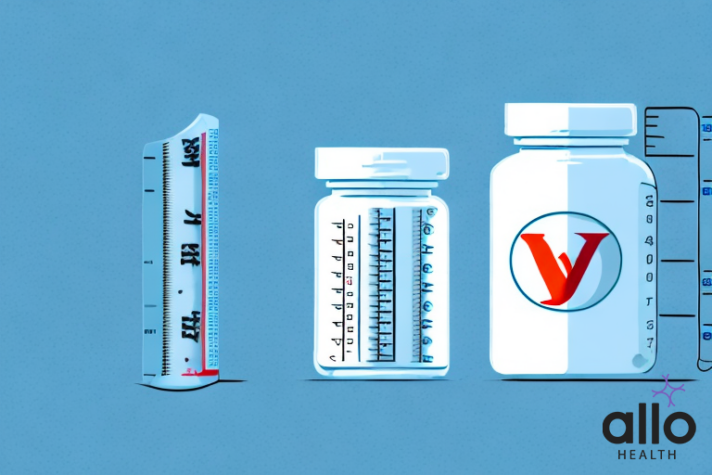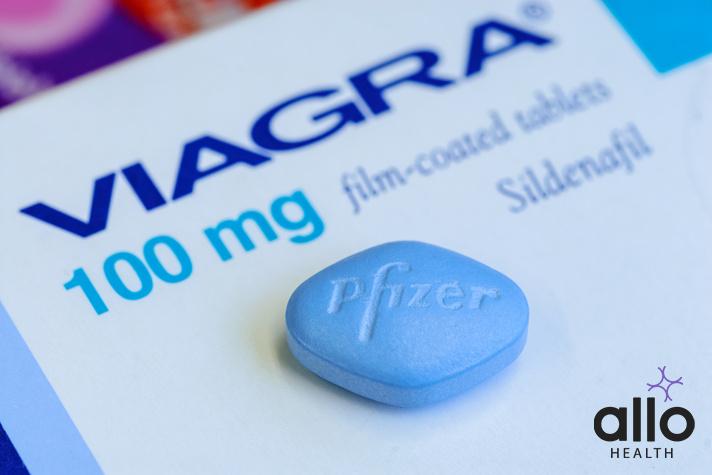How Much Viagra Should a Woman Take?

Allo Health is dedicated to personalized well-being, offering support and trusted information tailored to individual health goals. The platform emphasizes human-generated content, led by a distinguished medical team of experts, including physicians and sexual health specialists. Their commitment to credibility involves rigorous fact-checking, authoritative research, and continuous updates to ensure accurate, up-to-date information. Allo Health's unique approach goes beyond conventional platforms, providing expert-led insights and a continuous commitment to excellence, with user feedback playing a crucial role in shaping the platform's authoritative voice.

Dr. Aditi completed her undergraduate medical education at AJIMS, Mangalore, after which she worked in multi-speciality hospitals with COVID patients and in the Pain and Palliative medicine department. Driven by her experiences, she developed a keen interest in psychiatry. Dr. Aditi believes that mental health is just as, if not more important, than physical health.
Why This Was Upated?
Our experts continually monitor the health and wellness space, and we update our articles when new information became available.
Updated on 13 April, 2024
- Article was updated as part of our commitment to diversity, equity, and inclusion.

"The following blog article provides information about a drug or brand name drug and its potential effects or benefits. However, it is crucial to understand that this information is intended for general educational purposes only and should not be considered a substitute for professional medical consultation. It is highly recommended to consult with a qualified healthcare professional before making any decisions regarding medication, treatment, or healthcare management.
Book consultation
Individuals have unique medical conditions, and the information provided in this article may not be applicable to everyone. Only a qualified healthcare provider can evaluate your specific medical situation, taking into account your medical history, conducting appropriate tests, and providing personalized advice and recommendations. They are equipped to make informed decisions tailored to your individual needs.
It is crucial to emphasize that self-diagnosis, self-medication, or disregarding medical advice can have serious health consequences. This article may reference specific brand names or drugs for illustrative purposes. Mention of these names does not imply endorsement, recommendation, or guarantee of their efficacy or safety. The choice of medication should be based on discussions and individualized guidance from a healthcare professional who has a comprehensive understanding of your medical condition.
"Viagra or ‘little blue pill’, a well-known medication initially designed to treat erectile dysfunction in men, has sparked curiosity about its potential use in women. While Viagra is not FDA-approved for women, there is ongoing research exploring its effects on female sexual health.
In this article, we will delve into the current state of knowledge regarding Viagra use in women and discuss the importance of consulting healthcare professionals before considering any off-label use.
Viagra Background
Viagra tablets, also known by its generic name sildenafil, is a medicine primarily designed to treat erectile dysfunction (ED) in men. It was developed by the pharmaceutical company Pfizer and first approved by the U.S. Food and Drug Administration (FDA) in 1998.
The active ingredient of Viagra, sildenafil citrate, belongs to a class of drugs called phosphodiesterase type 5 (PDE5) inhibitors. These drugs work by relaxing smooth muscle tissue and dilating blood vessels, particularly in the genital area of the body. This mechanism of action enhances blood flow to the penis, facilitating an erection when sexual stimulation occurs.
The development of Viagra revolutionized the treatment of male impotence, providing a non-invasive and effective option for men experiencing difficulties in achieving or maintaining an erection.
Over the years, Viagra has gained recognition beyond its original purpose. Some studies have explored its potential benefits in treating conditions like pulmonary arterial hypertension and altitude sickness.
Furthermore, there has been ongoing research into the use of Viagra in women, although it has not received FDA approval for this population.

What is Low Libido?
Low libido, also known as hypoactive sexual desire disorder (HSDD), refers to a persistently reduced or lack of interest in sexual activity. It is a common sexual health concern that can affect individuals of any gender and age. While occasional fluctuations in sex drive are normal, persistent and distressing low libido can impact one’s overall well-being and may indicate an underlying issue.
Key characteristics of low libido include:
- Reduced Interest in Sexual Activity:
- Individuals with low libido often experience a noticeable decline in their desire for sexual intimacy. This can manifest as a decreased interest in initiating or engaging in sexual activities.
- Distress and Frustration:
- Low libido becomes a clinical concern when it causes distress or frustration for the individual or their partner. This emotional impact can further contribute to the overall decline in well-being.
- Consistent Pattern:
- The reduction in sexual desire is persistent and not attributed to temporary factors, such as stress or relationship issues. When low libido becomes a consistent pattern over an extended period, it may warrant attention.
- Impact on Relationships:
- Low libido can strain relationships, leading to emotional distance and potential conflicts. Partners may feel neglected or undesired, contributing to a challenging interpersonal dynamic.
Several factors can contribute to low libido, including:
- Hormonal Changes: Fluctuations in hormones, such as those occurring during menopause, pregnancy, or certain medical conditions, can impact sexual desire.
- Psychological Factors: Stress, anxiety, depression, and other mental health issues can significantly influence libido.
- Relationship Issues: Problems within a relationship, communication difficulties, or unresolved conflicts can contribute to a decrease in sexual desire.
- Medical Conditions: Certain medical conditions, such as diabetes, cardiovascular diseases, or hormonal imbalances, may affect libido.
- Medications: Some medications, including certain antidepressants and contraceptives, can have common side effects that impact sexual desire.
Addressing low libido often involves a comprehensive approach, taking into account both physical and psychological factors. Seeking guidance from healthcare professionals, such as gynaecologists, urologists, or sex therapists, can help identify the underlying causes and develop appropriate treatment plans.
Viagra For Low Desire For Sex In Women
Viagra (sildenafil) is not FDA-approved for use in women with low libido, hypoactive sexual desire disorder (HSDD) or female sexual arousal disorder (FSAD). Viagra is primarily indicated for the treatment of erectile dysfunction in men by increasing blood flow to the penis.
Research on the effectiveness of Viagra in addressing the lack of libido in women has been limited and inconclusive. While some studies have explored its potential impact on female sexual function, the results have been inconsistent, and the overall safety and efficacy of Viagra for women remain uncertain.
It’s important to note that low libido in women can be influenced by a variety of factors, including hormonal changes, psychological issues, relationship dynamics, and medical conditions. Addressing these factors typically involves a more comprehensive approach that may include counselling, lifestyle modifications, and, in some cases, medical interventions.
If a woman is experiencing low libido or sexual concerns, it is advisable to consult with a healthcare professional, such as a gynaecologist or a sexual health specialist. These professionals can conduct a thorough evaluation, identify potential underlying causes, and recommend appropriate treatments or interventions tailored to the individual’s specific situation.
It’s crucial to avoid self-prescribing medications like Viagra without medical guidance, as the effects and potential risks in women are not well-established. Off-label use of medications should only be considered under the supervision and recommendation of a qualified healthcare provider.
As research in this field continues, newer findings may emerge, so it’s essential to consult with healthcare professionals for the most up-to-date and personalized advice regarding the management of low libido in women.

Research on Viagra in Women
Research on the use of Viagra (sildenafil) in women has been a subject of interest, but it is essential to note that Viagra is not approved by the U.S. Food and Drug Administration (FDA) for use in women. The majority of studies have focused on its potential effects on female sexual function, with mixed results.
- Increased Genital Blood Flow: Some studies have suggested that Viagra may increase blood flow to the genital area in women, similar to its mechanism of action in men. This heightened blood flow could potentially lead to improved arousal and sexual satisfaction. However, the findings have not been consistent across studies.
- Effect on Sexual Dysfunction: Research has explored the use of Viagra in women with sexual dysfunction, including those with arousal disorders or difficulty achieving orgasm. Results have varied, and the overall efficacy of Viagra in treating female sexual dysfunction remains uncertain.
- Hormonal Impact: Viagra’s impact on hormones and the physiological aspects of female sexual function has also been investigated. Understanding how sildenafil affects hormonal balance and the intricate interplay in women’s sexual health is an ongoing area of research.
- Safety and Side Effects: Limited research has been conducted on the safety profile of Viagra in women. It is crucial to acknowledge that potential side effects and safety considerations may differ from those observed in men. Adverse effects, if any, need to be thoroughly understood through comprehensive studies.
- Psychosocial Factors: Female sexual function is influenced by a range of psychosocial factors, and researchers have explored how Viagra may interact with these elements. Understanding the broader context of women’s sexual health is crucial in evaluating the potential benefits and risks of using Viagra.
- Challenges and Considerations: Challenges in studying the effects of Viagra on women include the complex nature of the female sexual response, variations in study designs, and the lack of standardized guidelines for dosage. Additionally, ethical considerations and potential long-term effects need careful examination.
It’s important to emphasize that any use of Viagra in women should be approached cautiously, and individuals should consult healthcare professionals before considering off-label use. Self-prescribing or experimenting with medications without proper guidance can lead to adverse effects and potential health risks.
What Happens If A Woman Takes Viagra?
If a woman takes Viagra, the potential consequences and effects are not fully understood, and it may pose risks. Women do not typically experience the same physiological response to Viagra as men do, as its primary mechanism of action involves increasing blood flow to the penis.
Potential risks and side effects of Viagra use in women may include:
- Unpredictable Effects: The impact of Viagra on women’s sexual function is not consistent, and its efficacy for addressing female sexual concerns, including low libido, remains uncertain.
- Side Effects: Women may experience side effects similar to those observed in men, such as headaches, facial flushing, nasal congestion, blurred vision, severe drop in blood pressure and digestive issues.
- Health Risks: Viagra can interact with certain medications and medical conditions, potentially leading to adverse effects. Individuals must consider their overall health and any existing medical conditions before attempting to use Viagra.
- Lack of FDA Approval: Since Viagra is not approved for use in women, its safety and effectiveness in this population have not been systematically studied or validated.
Individuals need to prioritize their health and consult with healthcare professionals before considering any off-label use of medications like Viagra. Women experiencing sexual concerns or low libido should discuss their symptoms with healthcare providers who can explore appropriate and evidence-based treatment options tailored to their specific needs.

Dosage Considerations
Dosage considerations for Viagra (sildenafil) are primarily established for men with erectile dysfunction, as the drug is not officially approved for use in women by the U.S. Food and Drug Administration (FDA). The dosage for men is determined based on individual response, health status, and the severity of erectile dysfunction. However, it is crucial to note that self-prescribing or experimenting with Viagra without medical supervision can lead to adverse effects and potential health risks.
For men with erectile dysfunction:
- Starting Dosage:
- The typical starting dose, which is the lowest dose, for Viagra is 50mg, taken approximately 30 minutes to an hour before sex. This can be adjusted based on individual response and tolerability.
- Dosage Adjustment:
- Depending on how well the initial dose is tolerated and its effectiveness, a healthcare professional may adjust the dosage. Some individuals may require higher or lower doses to achieve the desired effect.
- Maximum Dosage:
- The maximum recommended dosage of Viagra is 100mg per day. Exceeding this limit can increase the risk of side effects without necessarily improving the drug’s efficacy.
- Individual Factors:
- Individual health factors, age, presence of underlying medical conditions, and concomitant medications can influence the appropriate dosage. Individuals need to provide a comprehensive medical history to their healthcare provider.
For women:
- Lack of Standardized Dosage:
- Given that Viagra is not approved for use in women, there is no standardized dosage. Determining an appropriate dosage for women is challenging due to the limited research on its effects in this population.
- Consultation with Healthcare Professionals:
- Women should consult with healthcare professionals, such as gynaecologists or sexual health specialists, before considering any off-label use of Viagra. Professionals can assess individual health factors and guide on potential risks and benefits.
- Potential Risks:
- The potential risks, drug interactions and side effects of Viagra in women are not well understood, underscoring the importance of medical guidance. Certain health conditions, such as cardiovascular issues, may increase the risk of adverse effects.
- Safety First:
- Both men and women must prioritize safety and adhere to healthcare professionals’ recommendations. Any adjustments to the dosage or usage of Viagra should only be made under the supervision of a qualified medical professional.
Bottom Line
Viagra (sildenafil) is not approved for use in women, and there are no standardized dosage recommendations. The effects of Viagra on women, including its impact on libido, are not well-established, and self-prescribing can pose risks.
Women experiencing sexual concerns should consult with healthcare professionals to explore safe and evidence-based solutions tailored to their individual needs.
Most Asked Questions
-
Can Women Take Viagra, and in What Dosage?
As of now, Viagra (sildenafil) is not FDA-approved for women, and there are no standardized dosage recommendations. Consultation with a healthcare professional is crucial to discuss potential risks, benefits, and alternative treatments tailored to individual needs.
-
What Happens if a Woman Takes Viagra?
The effects of Viagra in women are not well-established, and its safety has not been thoroughly studied. Women may experience unpredictable responses, and there is a risk of side effects. It's essential to avoid self-prescribing and seek professional medical advice.
-
Can Viagra Enhance Female Libido?
Research on Viagra's impact on female sexual function is ongoing, but conclusive evidence regarding its efficacy is lacking. Viagra primarily addresses physiological aspects of sexual response and may not necessarily address the multifaceted nature of female libido.
-
Are There Approved Alternatives for Women's Sexual Health?
For women experiencing sexual concerns or low libido, healthcare professionals may recommend approved treatments, such as counselling, hormone therapies, or medications specifically designed for women. Discussing symptoms with a healthcare provider ensures tailored and evidence-based solutions.
-
What Precautions Should Women Take Regarding Viagra Use?
Women should be cautious about self-prescribing or experimenting with Viagra. Potential risks, interactions with other medications, and health conditions need careful consideration. Open communication with a healthcare professional is crucial to addressing concerns and exploring safe and effective options for women's sexual health.






































